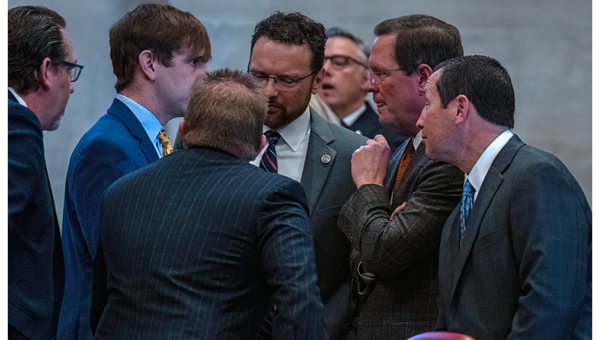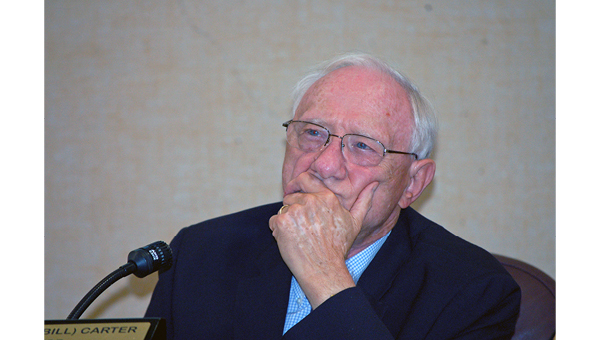Tennessee legislature approves $59.8 billion budget
Published 11:56 am Thursday, April 17, 2025

- House Finance Chair Gary Hicks, far right, huddles with members of House Republican leadership, including House Majority Leader William Lamberth, back to camera, and Speaker Cameron Sexton, by Hicks. (Photo: John Partipilo/Tennessee Lookout)
|
Getting your Trinity Audio player ready...
|
By Sam Stockard
Tennessee Lookout
Tennessee lawmakers approved a $59.8 billion budget Wednesday for the next fiscal year, but House members got hung up on a last-minute move to insert several million dollars to fund county primary elections statewide.
Two days after the House passed a separate measure to require primary elections, Republicans and Democrats challenged the addition of $8 million on the House floor to reimburse county election commissions for holding primaries.
Trending
The push for primaries stems from political division in Williamson and Maury counties where far-right groups want to hold caucuses rather than primaries to determine Republican nominees for local elections. Caucuses are gatherings of political party members to select nominees for elections, as opposed to primaries in which voters go to the polls.
The bill requiring primaries was presented as having no impact on the state budget, critics said.
Yet Republican Rep. Ryan Williams of Cookeville introduced the budget amendment Wednesday on the House floor, drawing immediate opposition from Republicans and Democrats before it passed 57-30.
Democratic Rep. Jason Powell of Nashville blamed Republican lawmakers for trying to inject the money late in the budget process to impact elections.
“This is a drastic change to the way we have conducted elections for a very long time in our state,” Powell said.
Republican Rep. Todd Warner of Chapel Hill in Maury County, where Republicans have held caucuses, was more adamant, saying he and other lawmakers were told the cost of the primary requirement bill was not significant.
Trending
“We were lied to in committee. We were lied to about this bill,” Warner said. He later added that the Senate’s budget discussions showed the money was added to pay for the primary bill.
Williams responded by saying the measure was “simply an appropriation” to local governments to pay for primaries. House Speaker Cameron Sexton backed him up, saying the money was needed to reimburse counties that have held primary elections already.
The Republican-controlled House defeated several attempts by Democrats to amend the budget to add items such as a grocery sales tax cut and shift expenses such as $120 million for private-school vouchers, $113 million for charter school administration and $4.5 million for 10 positions within the Attorney General’s Office to a fund to fix potholes on state highways. Another amendment would have moved more than $5 million for the state’s new immigration “czar” to cut waste and fraud.
Crunching the numbers
Of the $59.8 billion budget, which takes effect July 1, about $30 billion comes from state revenue and nearly $20 billion from the federal government.
Lawmakers took $179 million from the governor’s supplemental budget and put it toward 181 requests for legislation or spending in their districts.
The legislature also created a $42.5 million grant pool for volunteer fire departments, rescue squads, emergency medical services, senior centers, courthouses and museums and Second Harvest Food Bank, which suffered federal funding cuts
Republicans lauded the budgetary work, but Democratic Rep. John Ray Clemmons of Nashville said the past two GOP governors, including Gov. Bill Lee, have been living “high on the hog,” doubling Tennessee’s budget without improving people’s lives while giving tax breaks to out-of-state companies through the franchise and excise break. He predicted the state would hit a “fiscal crisis” in the next five years, in part because of a private-school voucher “scam.”
“This governor’s the single worst governor in the state of Tennessee’s history,” Clemmons said to a mix of cheers and jeers.
Clemmons also said a line can be drawn from Lee to his donors and state contracts, though he did not give details.
Republican leaders responded by saying Tennessee has the lowest debt per capita in the nation, in addition to a low tax burden.
Williams, chairman of the House finance subcommittee, countered, saying lawmakers had to cut more than $1 billion worth of state spending 15 years ago because the state was poorly managed by Democratic Gov. Phil Bredesen.
House finance Chairman Gary Hicks said the state has spent recurring revenue on non-recurring items, those that are to be funded for only one year, enabling it to maintain a “significant balance” at the start of each year.
Tax growth is slowing in the state’s general fund, zero growth this year and only 2% next year, which will generate $376 million, according to Hicks.
State Departments reverted $1.5 billion in unspent funds in fiscal 2024, leaving them to be spent on next year’s budget, he said.
The next budget also includes $700 million in interest earnings on federal funds the state received for COVID pandemic relief.
Major expenditures include $597 million for disaster relief, $640 million in new funding for K-12 education, including $198 million for one-time teacher bonuses connected to the private-school voucher vote early this year.
Higher education is netting $264 million more for universities, higher pay and benefits and capital improvements.
New spending of $1.5 billion for health and social services is part of the budget, as well, including TennCare shared savings between the state and federal government. It involves $78 million for rural hospitals, uncompensated care and $4 million for county health department projects.
The legislature is borrowing $1 billion to go toward road projects, a departure from state policy to pay for infrastructure with gas taxes.
Tennessee Lookout is part of States Newsroom, the nation’s largest state-focused nonprofit news organization. Follow Tennessee Lookout on Facebook and X.





